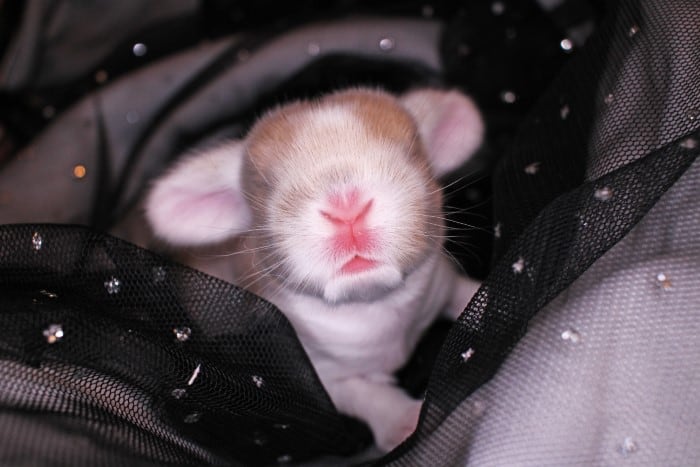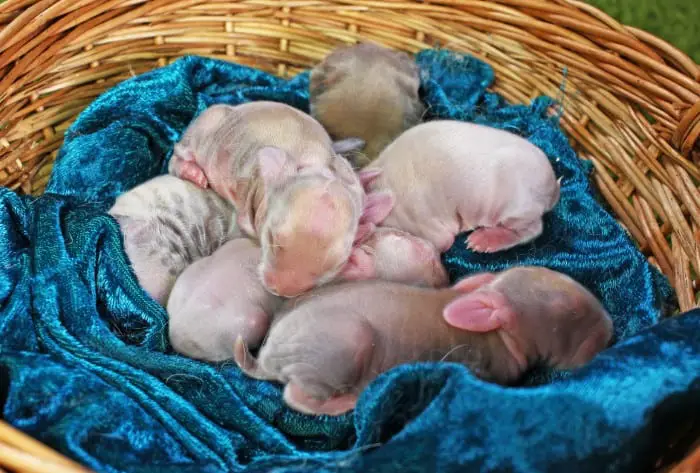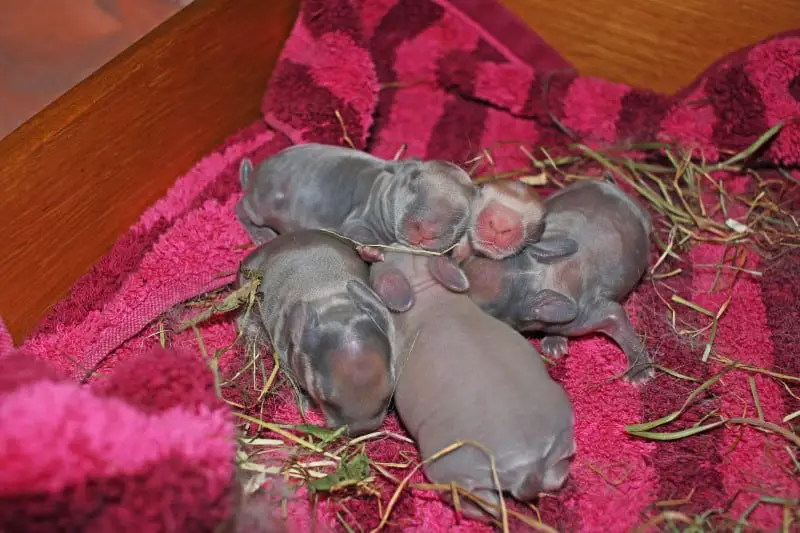If your bunny is having baby rabbits soon or you are just curious about baby buns in general. You have come to the right place. Here will be exploring when do baby rabbits get their fur. Your pet rabbits may be fluffy and have a gorgeous coat now. However, it did not start that way. Get ready for the inside scoop on baby rabbits and how their appearance changes as they grow.
What Do New-Born Rabbits Look Like When They Are Born?
Your pet rabbits may have luscious coats now, but when they are born, they look vastly different. Baby rabbits or kits as they are also called are born totally hairless. They are also very vulnerable at this stage since they can’t see or hear either. Their mobility is pretty limited at birth. They usually can only manage little wiggles. Additionally, they only weigh a few ounces and measure 2 to 3 inches in length.
Is There Any Breed Of Rabbit That Is Born With Hair?
You may think that rabbit breeds with particularly long hair and thick gorgeous coats may have gotten a head start in the hair department. However, this is not the case. All rabbits are born without fur.
Can I Tell What Colour My Baby Rabbits Will Be When They Are Born?
Actually, you can! The colour of the kit’s skin determines what colour fur he or she will have. If your rabbit’s skin is pink, he will most likely grow up to be a light coloured bunny i.e. blond or white. If her skin is dark, you are going to have a brown or black bunny. If your bun’s skin is mottled or 2 tone in colour, he or he will be multi-coloured with interesting patches of colour. While you may not be able to tell the exact hue, your kit will be, you will have a fairly good idea.

Why Do Baby Rabbits Need Their Fur?
The sooner a rabbit starts growing fur the better since helps them keep warm and regulate their body temperatures. This significantly increases their chances of survival.
When Do Kits Get Their Fur?
Thankfully, rabbits develop at a rapid rate, so you will witness changes on a daily basis. Baby rabbits start growing a light fuzz on their bodies by their third day of life. It has a peach coloured hue and that is beginning of a rabbit’s basecoat or undercoat. Unfortunately, this fuzz does not keep baby rabbits warm. At this stage, they get their warm from their siblings’ body heat in the nest.
By day 7, baby bunnies have a noticeable short layer of hair over most of their body. Their feet, belly, nose, and ears will still be relatively hairless.
By day 12, baby rabbits have a nice full coat that can keep them warm. At this stage, they may start to develop the fur colour that they will take into adult life. The hue may change slightly, but more or less this will be your bunny’s colour.
When Do Baby Rabbits Get Their Intermediate Coat?
If you are unfamiliar with the term, it refers to the coat in between the baby coat and the adult coat. It usually grows when your bunny is 4 to 6 weeks old. At this stage, your rabbit’s coat is a mixture of long guard hairs and downy hairs.
Your bun’s intermediate coat will grow thicker and thicker until finally it is replaced altogether by the adult coat. This process usually takes place between 4-12 months. You will be able to tell when your rabbit no longer has an intermediate coat. The adult coat looks different. Rabbit fur varies from breed to breed. However, the fur of a rabbit’s adult coat is longer and offers more protection. It is also smoother than the intermediate coat.
Is It Safe To Touch Baby Rabbits’ Fur?
This is a question that pet owners with new kits usually ask. Somewhere along the line, a myth started to circulate that you should not touch baby bunnies because the human scent would cause their mothers to neglect them. However, nothing could be further from the truth.
Rabbits are not bothered by human scent, especially if they already know you. Domesticated rabbits are comfortable with the scent of humans, they were bred that way. They will be able to detect their kits’ smell if you have touched them, so no need to worry.
The myth was probably started to discourage rough handling of rabbits especially by young children who don’t know better. Baby rabbits can be seriously hurt if they are not handled gently. Rabbits can become extremely stressed if they are touched in a rough manner. Bunnies have been known to die from extreme stress.
The reality of it is, if you are breeding rabbits, you will have to touch them when you weigh them to monitor their progress. Feeding time also requires contact. At times you may need to move them around. None of this can be done without human touch.

What really matters is how you touch them, remember to be gentle with your baby bunnies. When they are new-borns they can be very wriggling so keep a soft but firm grip on them to prevent any falls. Baby rabbits under the age of two weeks old should be scooped up with both hands. For bunnies that are a little older, you should firstly go down on your knees to pick them up. Then place one hand under their chest and support their rump in with the other hand. This method makes sure their entire body is supported. As you lift them hold them close to your body. If they are squirming this will limit their movements and they will not fall out of your arms.
Why Do Baby Rabbits Sometimes Lose Their Fur?
If you see your baby rabbits losing some hair during their daily grooming routine, you should not worry. Every rabbit loses a little fur daily, so there is no need to panic.
When your baby rabbits reach adulthood, they will moult every few months, this is completely natural. Depending on where you live in the world, they will also go through seasonal moults. In the springtime, bunnies shed their winter coats and it is replaced by a more comfortable summer one. The cycle begins again in the fall, where they shed their light summer coats and start growing their winter coat again.
Baby rabbits have their first moult at around 4 to 5 months old. This marks the start of their adult coat. Generally, you will not see any major hair loss before this developmental stage. If you do, there may be cause for concern. Let’s get into why baby rabbits may be losing their hair:
- Parasites – You always have to be on the lookout for fleas, ticks and mites that can take up residence in bunny ears. These critters cause skin irritation that leads to excessive scratching. Thus, resulting in hair loss. We recommend a flea comb for addressing fleas on your baby rabbits. All you need is the flea comb and a bowl of warm soapy water. Dip the comb in the soapy water each time you pass the comb through your rabbit’s hair. Flea bombs and sprays are also effective to treat your home. However, be sure you administer these treatments when your baby rabbits do not need to be in the room for a few hours. This will give the room sufficient time to air out.
- If you allow your baby rabbits to have jaunts outdoors, they may pick up ticks. If you notice that your baby rabbits have ticks, you will need to remove them manually with a tweezer. Remove them one by one. Have a bowl with alcohol handy to drown them in. Then clean the affected area.
- Mites can be treated by putting a few drops of natural oil like olive or coconut oil into your baby bunnies’ ears. The oil smothers the mites, giving your rabbits much-needed relief. Once you keep these parasites at bay, your baby rabbits will not experience any hair loss.
- Over-Grooming – If your baby bunnies are feeling stressed or they are bored they may take to overgrooming themselves or each other. This constant manipulation of the hair will cause hair loss.
- Infections – If a baby rabbit contract a fungal or bacterial skin infection, his hair may fall out in tuffs. If you suspect that your bunny has a skin infection, please take her to see your veterinarian right away and seek advice for treatment.
- Illness – If your baby rabbits are ill, one of the symptoms may be hair loss. If they are also lethargic and have appetite issues, take them to the veterinarian as soon as possible. Baby rabbits are fragile and any medical issue that they may be experiencing should be addressed immediately to increase their chance of survival.
Now that you know what to expect when it comes to baby rabbits’ fur, you will be able to monitor your kits progress. We recommend that you follow the nutritional guidelines when it comes to baby bunnies and before you know it, your bunnies will be covered in sleek beautiful fur.

